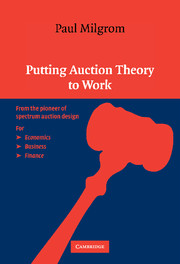8 - Package Auctions and Combinatorial Bidding
Published online by Cambridge University Press: 05 June 2012
Summary
In chapter 7, we found that multi-object auctions that promote uniform prices raise new problems not found in single item auctions. One is that if the bidders do not regard the goods as substitutes, then market clearing prices can fail to exist. When goods are not substitutes, the conception of auctions as mechanisms to identify market-clearing prices is fundamentally misguided. A second problem is that even when goods are substitutes, if the auction identifies uniform prices for each kind of good, there are generally incentives for bidders to bid for fewer units than they really want (demand reduction). That behavior can produce both inefficient outcomes and low revenue. So, even in those cases where the search for market clearing prices is not logically doomed to fail, mechanisms that might find market clearing prices when bidders are naïve may still perform poorly when bidders are sophisticated and strategic.
In this chapter, we explore another set of problems. When the auctioneer sells one indivisible good of fixed characteristics, she faces no question about how to package the goods offered for sale. If the characteristics of the good vary or if multiple buyers can divide it, we encounter that complex decision.
This decision can be complicated even in mundane sales, such as the sale of a farm estate after the death of a farmer. Although the whole estate could be sold as a single entity, it could also be divided into smaller pieces for sale to individual bidders with varying demands.
Information
- Type
- Chapter
- Information
- Putting Auction Theory to Work , pp. 296 - 338Publisher: Cambridge University PressPrint publication year: 2004
References
Accessibility standard: Unknown
Why this information is here
This section outlines the accessibility features of this content - including support for screen readers, full keyboard navigation and high-contrast display options. This may not be relevant for you.Accessibility Information
- 1
- Cited by
